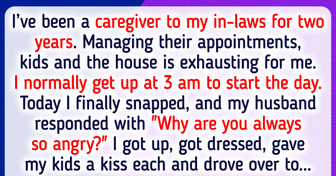My MIL Cut My Daughter’s Hair Without Permission, and Here Is What I Did

One significant challenge parents may face arises when their adult children resort to severing communication if financial support is not provided. This situation can be deeply distressing for parents who have invested considerable time, effort, and love in nurturing their children to adulthood.

When faced with demands for financial assistance, some parents may find themselves caught between their desire to help their children and their own financial limitations. However, when unable to meet these demands, it can lead to strained relationships or even complete estrangement.
Recently one reader shared his story. He’s been supporting his adult daughter through college, but lately, she’s been ignoring him, which is really upsetting. He’s always been there for her, but now she won’t even talk to him unless it’s through email.
«I always message my daughter to check on her and see how she’s doing. I call her every day and ask her to give me a call when she wants. I even suggested splitting her bills including plane tickets if she wants to visit me. But all I get back is a quick message saying she’s too busy.»

He’d been there for her every single morning, giving her what she needed to get through the day, bought her a car. But then she went and chose a college far away without even talking to him about it first. It hurt him deep down, made him wonder if she cared about all he’d done. So he reached out in a message, saying he couldn’t keep giving unless she showed some respect.
«I sent her one more message, and still, no reply. I might have sounded a bit tough, but I’m just fed up with feeling like I’m not being treated right. I want to give up, but I don’t know if it’s the right thing to do.»

When someone distances themselves from others, sometimes they end up completely cutting off contact. This can happen after a long time of arguing or if something upsetting happens suddenly. The person cutting off contact finds it hard to deal with the problem directly and calmly. Instead, they stop talking. They feel like keeping the relationship going is just too hard for them.
When parents and children are very emotionally involved with each other, they might be more likely to cut off contact when they’re feeling really anxious. Parents feel really powerless when they can’t talk to their child or even work things out with them. They might wonder if they should try to contact their child or not, how long they should keep trying, and what they should say if they do get in touch.

It’s not an easy situation but here’s what experts advice:
It’s never easy to maintain wisdom and patience when faced with a child who refuses to communicate. The silence can be deafening, leaving parents feeling helpless and uncertain about how to bridge the gap. In such moments, the urge to push for conversation or resort to frustration may be strong, but it’s essential to remember that understanding and empathy are key.











